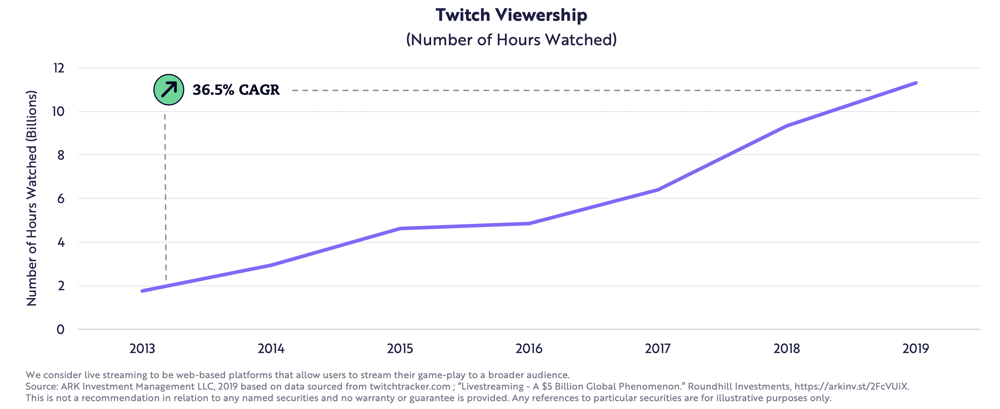The Coronavirus Is Forcing a Grand Work-at-Home Experiment
Follow James on Twitter @jwangARK
The coronavirus crisis is precipitating the largest work-from-home experiment in history. Tech companies, universities, and governments are sending employees, staff, and students home to prevent infections and to work or study.
Working and studying from home requires software that works anywhere and enables collaboration. Companies like Salesforce, Workday, and Google have been pushing cloud software for more than a decade. Almost overnight, it has gone from nice-to-have to mission-critical.
Video conferencing company Zoom has been one of the notable beneficiaries of this virus. In recent weeks, usage and free trials have ticked up, with significant interest from China, a market that historically has shunned western SaaS products. During the past month, as the stock market has dropped, Zoom has gained 19%.1
Team communication software, Slack, also has attracted a “massive outpouring of interest”, especially from countries impacted by the coronavirus. With an easy to access free tier, it has seen an uptick in new signups and team creations, boding well for conversions to paid customers in the future.
For most software companies, the near-term impact probably will be negative. Both Slack and Adobe lowered guidance for the second quarter, citing greater uncertainty, travel restrictions, and lower odds that deals close.
While the coronavirus should accelerate the adoption of cloud software in the long term, valuations in the near term have compressed and could continue to compress until this risk-off period abates.
[1] Information derived from third party data source.
Sports Have Been Canceled: So What Do We Watch Now?
Follow Nick on Twitter @grousARK
For years, live sports have held the Pay-TV market together, but now that concerns about the coronavirus have forced the cancellation of collegiate and professional sporting events, online gaming is likely to pick up a lot of the slack. Sports fans might find that live-game streaming services like Twitch or Mixer are interesting, if not perfect, substitutes.
We believe live streaming gameplay is one of the hottest trends in the video gaming space. As shown in the chart below, since 2013 Twitch viewership has grown at 36.5% annually, with more than 11 billion hours viewed last year alone.

President Trump Proposes an Additional $50 Billion in Small Business Administration Loans
Follow George on Twitter @GeorgeOfARK
On Wednesday evening, President Trump addressed the nation with the government’s response to the coronavirus (COVID-19). He proposed a number of initiatives including $50 billion for Small Business Administration (SBA) loans. The SBA sets guidelines for loans which ultimately are originated by partners, such as banks and community development organizations. To reduce the risk of making loans, the SBA guarantees up to 85% of each loan, enabling its partners to consider loan applicants they otherwise would not.
In our view, the SBA and alternative lenders such as PayPal, Stripe, Shopify and Square should work together to disburse loans. In 2019, Square facilitated 330,000 loans totaling $2.3 billion compared to the SBA’s 58,000 loans totaling $28 billion. In other words, the SBA loaned more than $450,000 on average to each business compared to Square’s $7,000, suggesting that Square is servicing many more truly small businesses. Moreover, Square can facilitate loans in 1-2 days compared to 2-3 weeks it takes the SBA.
By working together, the SBA and alternative lenders could disburse loans more effectively and efficiently to small businesses impacted adversely by the fallout from COVID-19.
Drones Could Mitigate Human Contact in Response to COVID-19
Follow Tasha on Twitter @TashaARK
This week, Matternet announced that it had developed a drone station to facilitate the delivery of medical specimens on hospital campuses. Available to hospitals on a subscription basis, Matternet allows drones to land and deliver payloads of diagnostics, pathology specimens, and medicine, while swapping out their batteries for return trips.
Matternet is partnering with Swiss Post in Switzerland and UPS in the US. Last October, UPS and Matternet received FAA approval to conduct some flights beyond visual line of sight, a critical step in enabling cost effective drone deliveries. As a result, one of their trial partners, WakeMed, has seen much faster and more predictable specimen deliveries. ARK estimates that, regulation permitting, drones will be able to deliver packages within 10 miles for just 25 cents, orders of magnitude cheaper than courier services.
Now that the COVID-19 crisis has spurred demand for contactless delivery, the adoption of delivery drones could accelerate. Regulators could step up their approval for certain use cases to facilitate rapid delivery solutions, especially now that self- quarantines will reduce the risk associated with flying above pedestrians. South Korea and China have been using drones to spray disinfectant and deliver medical samples and supplies.